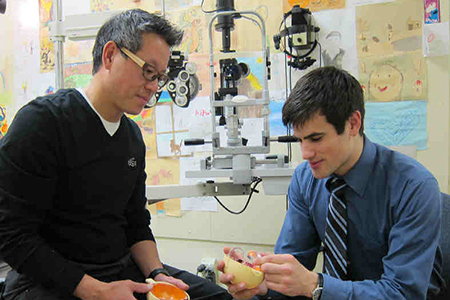Thinking about a career in health care but not sure you want the fast-paced and high-pressured lives of the doctors in Grey’s Anatomy, ER and Scrubs? Don’t worry! There are quite a few options for you even if you don’t have the desire to endure the rigors of medical school. (And, if you want to become a doctor, you don’t have to be a surgeon to do well—surgery is just a little “sexier” for TV shows!) There are many different majors and programs for you to pursue that lead to a wide variety of health care careers that are rewarding personally and financially.
A career in health care covers a broad range of professions and occupations. These include medicine, dentistry, nursing, pharmacy, physical therapy, veterinary medicine, psychology, speech-language pathology and social work. And, you don’t have to be involved in the “clinical” side of things. Health care is a big business, and there are opportunities to be involved in the management end, such as health care administration. Also, each of these areas has various sub-specialties.
So, if you feel you’re cut out for a field in health care, you’ll eventually need to ask yourself some questions: Do you want to treat patients for physical or mental problems? Would you like to work with patients directly or be in a management role? What’s most appealing: private practice, a hospital-based setting or a research facility? Don’t feel any pressure to sort out your entire life now. These are just a few ideas to help you identify your areas of interest.
What can I do in high school to prepare for a career in health?
Dr. Laura Thompson, Coordinator of the Health Fields Advising Program at Furman University, recommends high school students interested in health sciences to do four things:
First, take “a full course load for all four years of high school. Take as much math, science, and English as possible.” Good communication skills are indispensable.
Second, take as many Advanced Placement courses or International Baccalaureate courses as possible. “If you perform well in these courses, you may even receive college credit, which will allow you to move more quickly through the required college courses.”
Third, demonstrate your “leadership skills by holding office in student organizations.” When you’re working in a fast-paced emergency room, private practice, hospital administration or pharmaceutical company, your clients and colleagues will expect a take-charge attitude.
Fourth, volunteer in the field and, Thompson says, demonstrate “your ability to function successfully outside your socioeconomic group.” Nursing homes, clinics, and hospitals are good places to look. In college, you may find opportunities to shadow a doctor or assist in medical research.
What should I study in college?
Once you start college, your advisor will direct you to your school’s requirements for the health field in which you’re interested. Typically, colleges don’t classify pre-med or other analogous areas as majors. Rather, students seeking to attend a professional school will often have to take a certain minimum number of credits in specific areas, such as the sciences.
Some schools have specific pre-med and pre-health programs which, while not formal “majors,” give students access to an advisor who: ensures they take all of the courses required for medical or other professional health school; helps secure internships; and prepares students for the arduous testing and application process required for professional school in these areas.
If, however, you’re drawn to one of the areas that doesn’t necessarily require attending a professional or graduate school, such as nursing, nutrition, physical therapy, psychology, social work, health care administration or public health, you probably won’t have to take the same amount of science courses.
Some areas, like nursing, offer a number of different routes. For example, nurses can become Licensed Practical Nurses by attending a two-year certificate program. However, to be an RN (registered nurse) and command more money, responsibility and supervisory authority, a four-year bachelor’s degree is generally required. And, to get the bigger bucks in a specialized area of nursing, such as a nurse practitioner or nurse anesthetist, a master’s degree and/or experience will be required.
Some health care professions, such as physicians, pharmacists and dentists, must earn professional degrees before being permitted to practice. In some other areas, extra schooling may be required to hold yourself out as a certain type of professional. For example, psychologists generally need to receive a graduate degree while social workers do not. (See Sidebar below for degree requirements and average compensation.)
Consequently, you should be prepared to study hard throughout, and quite possibly beyond, college. As Hendrix College biology professor and pre-med advisor Mark Sutherland explains, “Don’t get discouraged if you find the course material challenging; almost everyone does. You will wonder several times during your undergraduate and [professional or graduate] school years if it is worth it. But if you find excitement and fulfillment in providing health care, it certainly is!”
One college I’m considering says it gets 90 percent of its pre-med students into medical school and other professional health programs. Should I try to attend this school?
There’s a lot to be said for a college that succeeds in getting most of its students into medical or other professional health schools — and for your desire to maximize your odds of getting into a professional health school. However, Sutherland warns, “There is no nationally standardized format for calculating acceptance rates to professional schools, so the numbers reported by one school may have little relationship to numbers reported by other schools. You should be very skeptical of extremely high numbers. A school may report a 100% acceptance rate because its one and only applicant was accepted, so this number tells you very little about the quality of their preparation program.”
The acceptance percentages at some of these schools are very high because the students in these programs who aren’t going to “make it” are politely told to seek a different major. So, just starting in these programs doesn’t ensure that you’ll get into the professional school for which the program is geared.
All of these careers sound great! How do I decide which one to pursue?
There are many factors to consider when selecting a career path. First and foremost, you should consider the stress and hours required of some health positions. Do you want a stable 9-to-5 job or are you willing to put in 12-hour days in an emergency room, clinic, or nursing home without the luxury of turning off your pager occasionally? Remember that the higher-paying areas will require more schooling. For example, according to Donna Shaffner, Daemen College’s Director of Undergraduate Admissions, “to be a competitive candidate for higher paying nursing positions with more responsibilities, you’ll need a B.S.N. and a master’s degree.”
Think also about your personality. If you nurture your friends and family, you’d probably be great working directly with patients as a doctor, nurse, social worker or psychologist. If you prefer working with professionals or business people, you might pick a medical specialty like anesthesiology or radiology or go into health care administration. Or, you might decide you’d like to do medical or pharmaceutical research.
Finally, while you shouldn’t choose your career path based solely on the monetary rewards, you should consider the pay relative to the amount of work, stress, and education you’ll have to endure. You’ll also need to factor in your abilities to pay back loans for college and professional school (if you expect to have any) and support yourself and any dependents you may have in the future. Keep in mind, however, that there will be a broad salary variation depending on where you work. A salary of $50,000 in Brooklyn, N.Y. isn’t the same as $50,000 in Topeka, Kan.
What is the outlook for health professions? Are some fields more promising than others?
It’s hard to make any general statements because of the high amount of specialization.
With our population growing older, an abundance of health professionals will be needed in coming years. “The demand will be high for all types of doctors as a large portion of the medical workforce retires,” says Sutherland. (The baby boomers have already started retiring and moving to warm climates!)
Anticipating this demand, “the American Medical Association has recommended that all medical schools significantly expand the number of doctors they train,” he adds. “There will probably be proportional increase in other health-related fields as well.”
Indeed, the Occupational Outlook Handbook published by the U.S. Department of Labor Bureau of Labor Statistics projects that most of the specific health care occupations will grow “faster” or “much faster” than average through the year 2014. You can look up your particular profession or occupation or interest at the Bureau’s Web site.
The Bureau also publishes the average income of health care professions. Remember these statistics are based on the average of all work levels so the average beginning salary will be lower. Also the compensation is affected by level of education and your particular specialty. In any case the average compensation for many of the health care professions is quite good.
Still uncertain about what health profession you’d like to pursue? Don’t worry. Remember most have the same basic undergraduate requirements and colleges rarely require you to declare (much less stick with) a major from your first day. Use your first year or two of college to get some science credits under your belt and sit in on specialized classes in nursing pharmacy physical therapy nutrition or any other areas in which you’re interested. If you do this volunteer in different fields and spend some time chatting with your advisor you’re sure to select the career option that’s right for you!
Time it generally takes to become a practitioner in different health professions (including college; these do not include the passing of licensing exams and/or any work experience that may be required) and mean compensation at all work levels:
| Nurse | 2-6 years | $56,880 |
| Pharmacist | 6 years (Pharm.D. degree) | $88,650 |
| Dentist | 8 years | $133,680 |
| Physician | 8 years of school plus 3-5 years of internship and residency training (time varies depending on the specialty) | $138,910 (non-surgeons); $177,690 (surgeons) |
| Physical therapist | 5-7 years | $65,350 |
| Registered Dietician | 4 years | $45,950 |
| Health care administrator | 4-6 years | $67,430 |
| Psychologist | 6-9 years (doctoral degree required for most positions) | $74,250 |
| Social worker | 4-6 years (master’s degree required for better paying positions) | $42,720 |
| Physician Assistant | 4 years | $71,070 |



